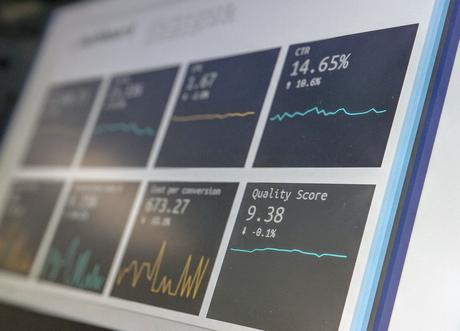Will human intelligence ever be enough for decision-making? Especially in an era where data is the backbone of financial services? It would be shocking if your answer to these questions is yes. However, one thing that has set artificial intelligence in fintech at the forefront of financial services is the application of methods derived from aspects of human intelligence at a beyond-human scale. Thus, leading to improvement in results.

AI for fintech is indispensable. It is indispensable because AI-driven decision-making serves as the future of intelligence in the financial sector. Moreover, AI continues to help fintech companies learn in-depth about their customers, thus shaping their decisions. In this article, we will discuss how AI in fintech is helping fintech companies to make rightful, faster, consistent, and accurate decisions through AI-powered analysis and processing of datasets.
AI in fintech: how artificial intelligence helps to make rightful decisions
Have you ever imagined how tedious and more like gambling decision-making would have been for financial services providers before the advent of AI in fintech? Arguably, financial services providers would have wished for superhumans to help solve human problems in their decision-making and increase efficiency. However, financial services providers are now leveraging AI in the fintech industry for rightful decision-making today.

Perhaps you are asking what AI decision-making is. AI decision-making involves making decisions based on data processed and analyzed in part or whole by an AI platform. With AI applications in fintech, the following are the types of decision-making for fintech companies:
Decision support
Decision support involves using artificial intelligence for fintech to collect, sort, and analyze datasets. Thus, providing data-driven insights for fintech companies to make better decisions. Usually, AI is used for predictive, diagnostic, or descriptive analysis of datasets and human experts proceed to make accurate decisions with the generated intelligent insights. Therefore, it involves the combination of artificial intelligence and human intelligence.
For example, fintech companies can use AI to gather information on people’s social networks, smartphone content, and location. After that, a human expert can use this information to decide whether to grant someone a loan or offer a discount on products and services.
Decision augmentation
Fintech companies also use AI for fintech to make better AI data-driven management decisions based on machine recommendations after data analysis instead of human experts. In this decision-making process, AI is usually used for the predictive and prescriptive analysis of datasets, and human experts proceed to make final decisions based on recommended alternatives.

For example, unlike decision support, where AI is only used to gather customer data or information, AI machines can further recommend whether to grant someone a loan or offer a discount on products and services. However, a human expert still makes the final decision based on AI-generated recommendations.
Decision automation
The third type of decision-making for AI-based fintech is decision automation, similar to decision augmentation. It involves automated decision-making by an AI-powered machine based on predictive and prescriptive analysis of datasets with little or no human involvement. Thus, fintech companies can rely on its consistency, speed, and scalability in decision-making.
For example, AI-powered machines are allowed to make automated decisions on whether to grant someone a loan or offer a discount on products and services.
How is AI used in fintech for making rightful decisions?
Marketing Decisions
AI in fintech helps fintech companies to overcome the daily complexities involved in decision-making, especially customer-driven marketing decisions. For example, fintech companies always look for ways to grow their customer base. Therefore, fintech companies need to understand their customers’ needs, requirements, and desires to retain and gain new customers.

Furthermore, fintech companies must ensure that their products and services align with their customers’ needs, requirements, and desires. Thus, fintech companies adopt AI modeling and simulation methods to gain insights into customer data for better marketing decisions. Also, AI-powered methods can be used for market forecasting and trend analysis.
Recommendation System
Data analytics is crucial for fintech companies to optimize their performances, make better decisions, and serve customers. Therefore, AI in the fintech industry is important for developing recommendation engines. A recommendation engine is a set of smart algorithms to consider customer profiles, impulse behavior, and any products or services they may have purchased.
Usually, AI-powered recommendation engines predict customers’ future needs and offer them personalized options they might go for in the future. Thus, helping fintech companies to tailor products and services based on what customers buy or browse. It can also be used to understand the motivations and interests of customers and provide insights into their needs and product preferences.
Business Decisions
One major advantage of AI applications in fintech is its revolutionary impact on human intelligence for decision-making. Gone are the days of rash and uninformed decision-making by fintech company owners and executives, whereby incomplete and inconsistent datasets were used as the basis for decision-making. However, fintech company owners and executives can now make better, rightful, and informed decisions based on AI-powered models and simulations of datasets.

For example, AI in fintech offers business executives the opportunity to augment and automate their decision-making processes. Thus, leading to faster and more accurate decisions. Furthermore, fintech companies can reduce tedious tasks and employee-intensive labor by augmenting or automating their operational activities. AI-powered tasks also help to better equip fintech companies against risks and losses using AI decision-making algorithms. These algorithms ensure that fintech companies are not stopped by risk aversion from making great business decisions.
AI in fintech: Wrap-up
This article has discussed how AI in fintech is helping fintech companies to make rightful, faster, consistent, and accurate decisions through AI-powered analysis and processing of datasets. We can deduce that AI applications in fintech in collaboration with human intelligence will continue to help fintech companies to make error-free decisions. Therefore, a decision-making model comprising human and artificial intelligence is the way forward for fintech companies.
Furthermore, you can contact EPAM Anywhere Business, an expert in big data development services, for meaningful mining data from multiple sources and consolidating it into custom intelligent solutions for rightful decision-making in the financial sector. So, what is delaying you from getting trusted help? You can also check out this recommended article on the future of AI in financial services.

